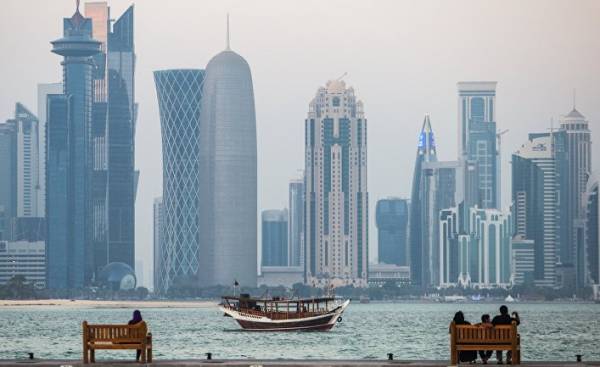
Doha, Qatar. — Until recently, live in Qatar was quite nice. But suddenly Saudi Arabia with the support of President Donald trump, who criticism of the ruling Royal families turned into their supporter, led the efforts of isolating its small neighbour. This is the greatest paradox, but Riyadh, whose population is more than any other country collects the money and delivers people to carry out terrorist attacks against Americans, has accused Doha of supporting terrorism.
The outcome is a hypocritical Jihad Saudi Arabia is impossible to predict. Moderate Kuwait did not support Saudi Arabia, whose leaders included among the most wicked rulers in the Muslim world, is guided solely by an intolerant government. Despite the wild trump of Saudi Arabia, Ministry of defense and the state Department took a more balanced position. Turkey rushed to the aid of Qatar, Iran started to supply the food, and Russia, are increasingly operating in the middle East, has called for a diplomatic settlement of the conflict.
The countries of the Persian Gulf impermissible quarrels and disagreements. From the Gulf States, there is one very important thing in common: they are all essentially fictitious country. Yes, they have governments, diplomats, army. But it is a monarchy, partly a new sample, and they exist in a world that has long since abandoned edisonoside.
And they charge foreigners for the hard work, from manual labor to skilled professional activities. They are more similar than country, and country clubs in which a few wealthy clients in fact make the rules and hire people to implement them. A significant part of the population of these countries foreigners living in shadows and having very few rights and no opportunities to participate in the political life of those societies in which they live.
When the plane landed in Doha, it is immediately clear that Qatar cannot live without foreign workers. Almost all of the important work carried out by foreigners. It’s the same in other Gulf countries.
States rarely give jobs for outsourcing. Do Western countries, but usually they do it on their own people, to save money. Unique Gulf countries doing what they are very dependent on foreign labor, and that the reasons for this are quite unusual: they don’t want their own citizens to worry about work, or at least that they worked too hard.
The growing importance of expats due to the oil wealth. In the early 1970s, foreigners in the countries of the Persian Gulf was little. But when starting in 1973 began to rise oil prices, revenues in these States increased significantly, and in parallel with this increased demand for foreign labor. The number of expats in the Gulf countries for ten years has tripled. And their number continues to grow. At the same time, the share of the non-Arabs (and Muslims).
Estimates on the number of expats is very approximate, but the numbers are still staggering. To 90% (by some estimates, a little less) of the inhabitants of the United Arab Emirates are foreigners. Foreigners make up about 85% of the population of Qatar. In Kuwait, 70%. In Bahrain, the share of expats 55%. The least notable of the Gulf States of Oman and the most populous country in the Persian Gulf Saudi Arabia behind them with a 30% figure. Although a desert Kingdom in the last place, 30% means that there lives and works more than eight million foreigners. These countries differ sharply Iran, Iraq and Yemen, which have gone another way.
It is obvious that money brings, if not happiness, then convenience. In the Gulf countries, it usually works flawlessly. But due to the decline in oil prices, the current in the Gulf scheme has been subjected to considerable load. These countries, accustomed to wasting money, today, faced with a deficit and maintain spending, are forced to borrow. But to get you borrowed money today, too easy. Credit ratings of Bahrain and Oman fell to “junk” level.
Kuwait, where democratically elected National Assembly, faced with the resistance of the population, who does not want spending cuts, especially to social needs, and economic subsidies. Approximately half of the members elected in November, the National Assembly formed an unofficial opposition. The tension feels even the most dictatorial state in the Persian Gulf of Saudi Arabia. Last fall, the Deputy crown Prince, led the work on optimization of expensive social benefits and subsidies, and government wages, but the monarchy has recently rejected these cuts. This will further exacerbate fundamental economic problems.
Another target for cost reduction was the work of expats. For many years the Gulf States officially declare the necessity of the replacement of foreign labour by local staff, but a little confused by this. Recently, some countries have renewed efforts to reduce dependence on Expat labor, introducing taxes on the employment of foreigners, requirements on hiring local population for some professions and quotas on employment in individual industries. Some countries have even detained and deported expats. But the growing cash deficit may be the most powerful incentive for change.
However, to create a normal balance of the workforce will be very difficult. The first problem is the huge number of workers in the Gulf countries expatriates. A country in which foreigners working in nine times more than the local, unlikely to be able to easily replace foreign workers. Although many jobs irrelevant, for example, domestic workers, they are still popular.
Another problem is the lack of professional skills. Some jobs require special training and vocational education, and that takes money and determination. The interest of the local population to such professions does not correspond to the demand. Even worse is that many locals are not inherent in hard work.
Another issue is the confidence of the local that they have special rights and privileges. The number of local people in the private sector is growing. But public posts remain the preferred place to work. Even locals joke about this difference. Kuwaiti officials are privately very unflattering comments about the willingness of their citizens to work. Many residents of the Gulf countries believe that the national oil wealth gives them the right to a cushy but well-paid job.
Moreover, citizens feel that they live in a social contract. The monarchs of dubious legitimacy to rule until share with its citizens incomes, which allow them to lead an easy and carefree life. Foreign labor becomes part of the contract because the rights of a citizen available to very few, as a privilege. Although the authorities retain control over law enforcement agencies and security services, there is also a very creative exception. So, Bahrain imports from Bangladesh and Pakistan Sunni Muslims who work in emergency services and the police.
Many Americans and Europeans love their welfare state and demanding more benefits and privileges. But in all these countries, these same people pay taxes, and sometimes were forced to carry military or other national service. Most consider their political community larger and more holistic education and citizenship is perceived as something that goes beyond bilateral transactions. In the Gulf countries perception different.
Today, the media is dominated by news of the attack on Qatar, which will be led by Saudi Arabia, but the flood plain of the state face more severe challenges. Will be able to survive and live forever artificial States, buying the loyalty of its citizens, and the hard work of the giver at the mercy of others?
Iran is causing fear in Riyadh and its neighbors, because it is more of a moral than a military threat. The Islamist government in Tehran is disgusting, but it offers the meaning to those people who believe in something more than money. Power on a contractual basis is weak at the best of times. And when cash flow weakens, it also becomes unreliable.
To survive, the countries of the Persian Gulf is not enough to find answers to simple questions about the replacement of foreign labour by local personnel and austerity. They must carry out political reforms that will allow people to participate more actively in the Affairs of their society. Ultimately, the best way to defeat Iran is to give people a more convincing leadership philosophy and a true sense of community. Today, these features are completely absent in monarchies, which is the closest Arab allies of America in the region.
Doug Bando — senior fellow at the Cato Institute (Cato Institute), former special assistant to President Reagan and author of several books, including “Foreign policy folly: the new global Empire of America” (Foreign Follies: America’s New Global Empire).







